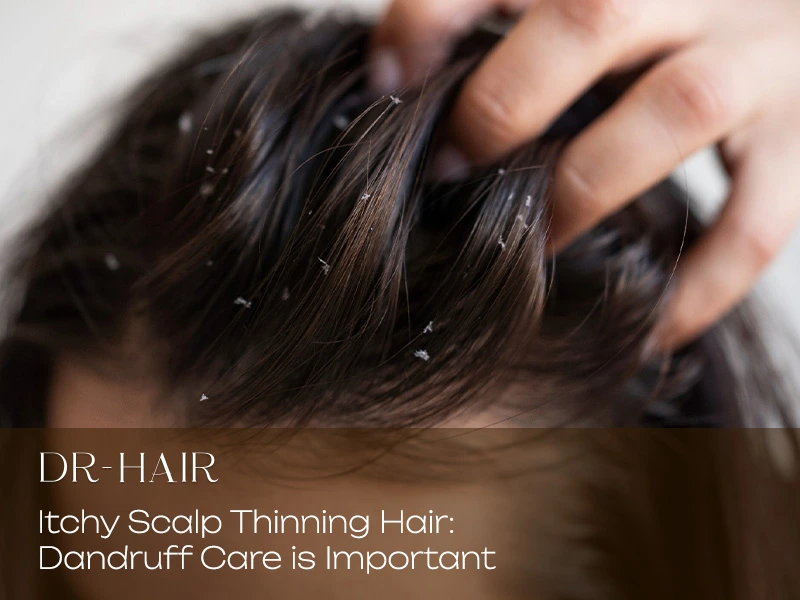Treat Itchy Scalp Thinning Hair
If you’ve been dealing with itchy scalp thinning hair, you’re not alone. Many people experience this frustrating combo without realizing that one may be causing the other. That relentless itch, those annoying flakes, and the gradual decrease in hair volume could all be part of the same underlying issue: dandruff.
While dandruff is often brushed off as a minor inconvenience, it can wreak havoc on scalp health, ultimately impacting your hair’s growth cycle. If you’ve noticed signs of itchy scalp thinning hair, it’s time to look closer at what’s happening beneath the surface—and why treating dandruff could be the missing step in your hair care routine.
What Causes Itchy Scalp Thinning Hair?
The relationship between itchy scalp thinning hair is more than coincidental. Your scalp is the foundation of hair growth, and when it’s compromised—whether by dryness, inflammation, or irritation—your hair often suffers too.
Common causes of itchy scalp thinning hair include:
Seborrheic dermatitis: A severe form of dandruff that causes red, itchy, flaky skin.
Fungal overgrowth (Malassezia): Yeast imbalances can cause inflammation and shedding.
Dry scalp: Can lead to flaking, itching, and reduced hair vitality.
Clogged hair follicles: From product buildup or oil, preventing proper hair growth.
Stress or hormonal changes: Both can trigger scalp inflammation and hair thinning.
The result? A scalp that’s constantly irritated and unable to support healthy, consistent hair growth.
How Dandruff Impacts Hair Growth
When you’re facing itchy scalp thinning hair, dandruff is a common, often overlooked root cause. Here’s how it plays a role:
1. Chronic Inflammation
Dandruff can cause low-grade inflammation of the scalp. Over time, this inflammation damages the hair follicles, leading to premature shedding and reduced hair density.
2. Excessive Scratching
An itchy scalp often leads to scratching—which physically weakens the hair at the root. Repeated scratching damages both the scalp surface and the follicles beneath it, accelerating thinning hair.
3. Blocked Follicles
Flakes, excess oil, and residue from hair products can block follicles. A clogged follicle can’t support a healthy hair strand, which contributes directly to itchy scalp thinning hair.
4. Poor Scalp Environment
A healthy scalp maintains a delicate balance of oil, pH, and microbes. Dandruff disrupts this balance, making the scalp less hospitable for new hair to grow.
Why Treating Dandruff Can Improve Hair Growth
Treating dandruff isn’t just about eliminating flakes. For anyone dealing with itchy scalp thinning hair, it’s a vital first step toward long-term hair health.
Here’s why it matters:
Removes buildup and flakes: Clears the path for healthy hair to grow.
Soothes irritation: Reduces inflammation, allowing follicles to heal.
Supports follicle function: Healthy follicles produce thicker, stronger hair.
Improves circulation: Clean, clear scalp tissue receives nutrients more effectively.
If you’re tired of dealing with itchy scalp thinning hair, targeting dandruff directly may be the game-changer you’ve been looking for.
Best Treatments for Itchy Scalp Thinning Hair
Whether you prefer natural remedies or dermatologist-recommended products, here are proven ways to treat itchy scalp thinning hair caused by dandruff:
1. Use a Medicated Anti-Dandruff Shampoo
Look for active ingredients like:
Ketoconazole (antifungal)
Zinc pyrithione (antimicrobial + anti-inflammatory)
Salicylic acid (exfoliates dead skin and buildup)
Coal tar (slows skin cell turnover)
Use these shampoos 2–3 times a week to reduce flakes and restore scalp balance.
2. Hydrating and Soothing Scalp Treatments
Apply lightweight serums or oils that include:
Tea tree oil (natural antifungal and soothing)
Niacinamide (improves skin barrier and reduces inflammation)
Aloe vera (cools and hydrates irritated skin)
These ingredients target the itch while supporting long-term scalp health, essential for anyone managing itchy scalp thinning hair.
3. Gentle Scalp Exfoliation
Use a scalp scrub once a week to remove buildup and unclog follicles. This encourages circulation and helps with hair regrowth in areas affected by flaking.
4. Diet and Hydration
A diet rich in omega-3 fatty acids, zinc, biotin, and antioxidants will support scalp and follicle health from the inside out.
5. Reduce Heat and Chemical Stress
Avoid over-styling and heat tools while your scalp heals. This minimizes additional irritation for those struggling with itchy scalp thinning hair.
When to See a Specialist
If your symptoms are severe, or if your itchy scalp thinning hair continues despite home treatments, it might be time to consult a dermatologist. You may be dealing with psoriasis, eczema, or another condition that requires prescription treatment.
Frequently Asked Questions
1. Can dandruff really cause itchy scalp thinning hair?
Yes. Dandruff can irritate the scalp, causing inflammation and blockage of hair follicles—leading to increased shedding and reduced hair growth.
2. How soon can I see hair regrowth after treating dandruff?
Results vary, but many people notice less shedding within 3–4 weeks and visible regrowth after 2–3 months of consistent care.
3. What are the best products for itchy scalp thinning hair?
Look for medicated shampoos with antifungal agents, soothing scalp serums, and lightweight oils that target irritation and follicle health.
4. Can I use natural remedies to treat itchy scalp thinning hair?
Absolutely. Tea tree oil, aloe vera, and apple cider vinegar can reduce flakes and calm irritation. However, persistent dandruff may require medicated solutions.
5. Should I avoid washing my hair too often if I have an itchy scalp?
No—regular washing (every 2–3 days) helps remove buildup and maintain a healthy scalp environment. Just be sure to use gentle, non-drying products.
Final Thoughts: Scalp First, Hair Second
When it comes to itchy scalp thinning hair, it’s easy to focus on the hair you’re losing rather than the scalp it’s growing from. But healthy hair always begins with a healthy scalp.
Dandruff is more than a cosmetic issue—it’s a warning sign. Addressing it early can prevent further thinning, reduce irritation, and create the ideal conditions for your hair to thrive. Don’t ignore the itch. Treat the cause, not just the symptoms—and give your scalp (and your hair) the care it truly needs.
